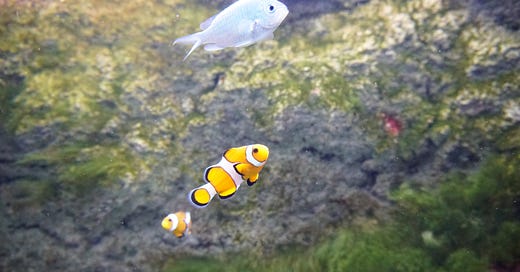The capital-T Truth is about life before death. It is about the real value of a real education, which has almost nothing to do with knowledge, and everything to do with simple awareness; awareness of what is so real and essential, so hidden in plain sight all around us, all the time, that we have to keep reminding ourselves over and over: This is water. This is water. - David Foster Wallace
A good commencement speech gets me every time—my eyes well up with tears and goose bumps rise up my arms. The best of speeches have me nodding in agreement and contemplating whether I've taken their advice and how I might do so. This year, Ken Burns summed up several nuggets of advice found across speeches, through time: "Be curious, not cool. Be virtuous and purposeful, do good things. Help others. Do not get frozen in the ice of your own indifference. Don't confuse success with excellence, those Benjamins are a means not an end. Do not descend too deeply into specialism. Educate all of your parts, you will be healthier. Read. ... Travel, do not get stuck in one place. Be in nature. ... At some point, make babies. ... Do not lose your enthusiasm."
Many commencement speeches, although uplifting, are often conventional and predictable: "follow your dreams" and "embrace failure" are words of advice frequently shared. The advice may be good, but it is devoid of context. Sure, the speakers tell stories of their failures on the road to achieving their dreams, but most graduates will not be the next Denzel Washington, Steve Jobs, or Will Ferrell, nor are they trying to be. These speakers' experiences of navigating the world do not mirror those of graduates who simply set out to climb the corporate ladder in a white-collar world. Maybe graduates ought to aim higher or dream bigger, but they likely won't.
David Foster Wallace's 2005 commencement address at Kenyon College, a liberal arts school, is my favorite speech. He paints a picture of adulthood that is laughably mundane but accurate. He grounds his message in the typical day in, day out life that most adults experience. And his message is not to dream big or take risks; he aims to lay out the purpose of an education. Not its value for getting a job or amassing material goods, or even making social changes in the world, but it's human value—the value an education brings to living your everyday life.
Wallace describes the monotony of daily routine: the annoyances of long check out lines in grocery stores, broken carts and dirty parking lots, and perpetual traffic. He tells graduates that they can be endlessly annoyed by guys who loudly speak on their cell phone, the needlessly large SUVs that cut you off, or ladies screaming at her kids in stores. Or they can choose to think about reality differently. They can choose not to view themselves at the center of the universe, growing ever more frustrated by what is happening to them, and instead consider how others might experience reality—the screaming lady may be dealing with a sick husband at home, and the driver of the SUV may be rushing a sick kid to the hospital. This, he submits, is the true value of an education: the choice of what to think. Learning how to think, Wallace argues, is really about choosing. Indeed, the ultimate purpose—the end—of a liberal arts education is to contemplate what is worth doing in life, through the lens of the good, true, and beautiful, and how one chooses to view the world dictates what one does in the world.
Humans are self-interested, and interpreting everything through the lens of self is our default setting. Wallace claims that the freedom of a real education, the capital-T Truth, is that we get to decide how we're going to see the world. That by altering our default setting to consider the lives of others we become well-adjusted—a little less arrogant, with a little more critical awareness about our certainties. We can keep ourselves from "going through [our] comfortable, prosperous, respectable adult life dead, unconscious, a slave to [our] head and to [our] natural default setting of being uniquely, completely, imperially alone day in and day out."
To Wallace, this is the "real, no bullshit" value of a liberal arts education. I'd say, this is the real value of an education. Full stop. To be able to consider reality without you at the center. To understand that beliefs are constructed, not innate. To believe in things that are beyond the self and the material world. To be a little humble about what we know for certain. And to relentlessly pursue the truth, even when it seems unattainable. The default setting is easy, choosing to be conscious day in, day out is more difficult—much more difficult. But, I submit, that's what it means to be educated.




